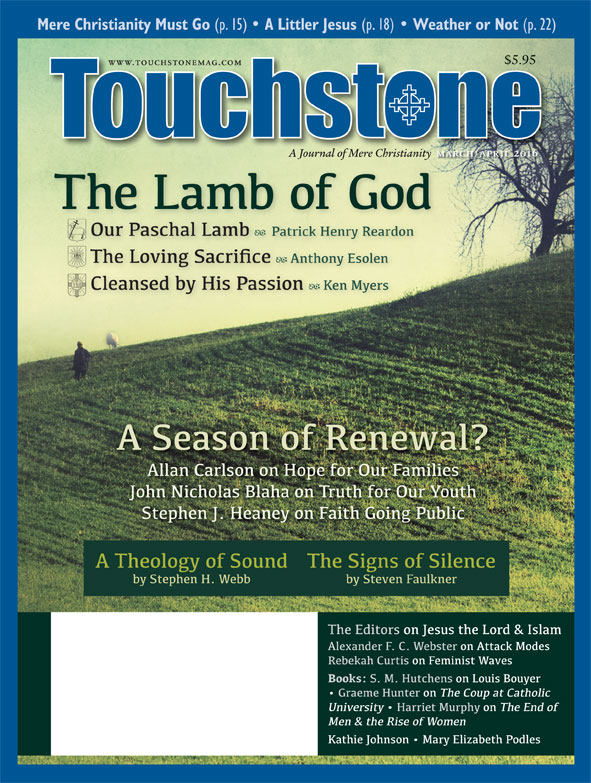Editorial
The Only Lord We Know
On the Confession of the One True God
Every Easter Season, Christians read about the Apostle Thomas kneeling in worship before the Risen Christ and confessing him as "My Lord and my God." How could a Jew say this to a man? The man before whom Thomas knelt bore scars from a crucifixion. What sort of God is this that we Christians worship?
It is reasonable, we suppose—or at least natural—for modern students of religion to wonder how the earliest Christians, all of them Jews, were able to reconcile their belief in the deity of Christ with the monotheism enshrined in Israel's Sh'ma (Deut. 6:4). Indeed, historians of Christian thought have devoted many studies to that inquiry. Looking at the apostolic writings through the lens of this inquiry, we gain an interesting impression of the earliest Christians: their confession of the deity of Jesus, while it was difficult, seems not to have been complicated.
First, the recorded difficulty of the apostles was not an impasse of reason ("How can this Jesus be both God and man?") but a failure of perception ("They did not understand about the loaves, because their hearts were hardened"—Mark 6:52; cf. 8:13–21).
Second, when they did arrive at this profession, in due course, the journey was not complicated. Their arrival did not result from a subtle mental process ("Well, let's see, perhaps he is one person in two natures") but from an immediate experience involving both Jesus' identity and their own destiny: "You have the words of eternal life, and we have come to believe and to know that you are the Holy One of God (ho Hagios tou Theou)" (John 6:68–69).
It is most significant that the two verbs introducing Peter's confession here—"to believe and to know"—are expressed in the Greek perfect tense: pepistevkamen kai egnokamen. The nuance of the expression is subtle; the apostles, when they reflect on what they now confess, perceive that they already know the identity of Jesus. Even though they have not figured it out, they discover it is already an established conviction—a prior, implicit knowledge of Jesus' identity. Peter, faced abruptly with the question of leaving Jesus ("Will you also depart?"), immediately discerns why he and the others cannot do it: they know who he is! Abandoning him, they would forfeit eternal life.
The apostles are making, rather, a basic creedal statement. In its full form, it runs like this: "I believe in one Lord, Jesus Christ." He is one Lord, because—as all Jews know (and would lovingly die for)—"the Lord is one" (Deut. 6:4; Eph. 4:5). Jesus is identified in the terms of the Sh'ma. In the Bible, monotheism is about identity.
The apostles make this step in response to Jesus' assertion, "I came forth from the Father" (exselthon para tou Patros) (John 16:28). They affirm this claim, not because of a religious theory that warrants it, but because, as they watch and listen to Jesus, they discern in him the One who sent him: "He who sees me sees him who sent me" (John 12:45). "He who has seen me has seen the Father" (14:9).
A Matter of Identity
Modern students of religion, regarding the matter as an intellectual dilemma, try to imagine how the apostles, when they affirmed Jesus' deity, were able—as a step of logic—to reconcile that affirmation with their monotheism. In the apostolic corpus, however, there is not the slightest indication that the apostles experienced Jesus' deity as an intellectual problem. What, then, did the apostles suppose that modern students of religion do not suppose?
It is this: for modern students of religion—generally speaking—monotheism involves a fundamentally mathematical thesis, "There is one God," as distinct from "more or fewer" than one God; start counting gods, and when you get to one, stop counting. Consequently, all those who believe in one God must logically believe in the same God.
James M. Kushiner is the Director of Publications for The Fellowship of St. James and the former Executive Editor of Touchstone.
Patrick Henry Reardon is pastor emeritus of All Saints Antiochian Orthodox Church in Chicago, Illinois, and the author of numerous books, including, most recently, Out of Step with God: Orthodox Christian Reflections on the Book of Numbers (Ancient Faith Publishing, 2019).
subscription options
Order
Print/Online Subscription

Get six issues (one year) of Touchstone PLUS full online access including pdf downloads for only $39.95. That's only $3.34 per month!
Order
Online Only
Subscription

Get a one-year full-access subscription to the Touchstone online archives for only $19.95. That's only $1.66 per month!
bulk subscriptions
Order Touchstone subscriptions in bulk and save $10 per sub! Each subscription includes 6 issues of Touchstone plus full online access to touchstonemag.com—including archives, videos, and pdf downloads of recent issues for only $29.95 each! Great for churches or study groups.
Transactions will be processed on a secure server.
more from the online archives
calling all readers
Please Donate
"There are magazines worth reading but few worth saving . . . Touchstone is just such a magazine."
—Alice von Hildebrand
"Here we do not concede one square millimeter of territory to falsehood, folly, contemporary sentimentality, or fashion. We speak the truth, and let God be our judge. . . . Touchstone is the one committedly Christian conservative journal."
—Anthony Esolen, Touchstone senior editor










